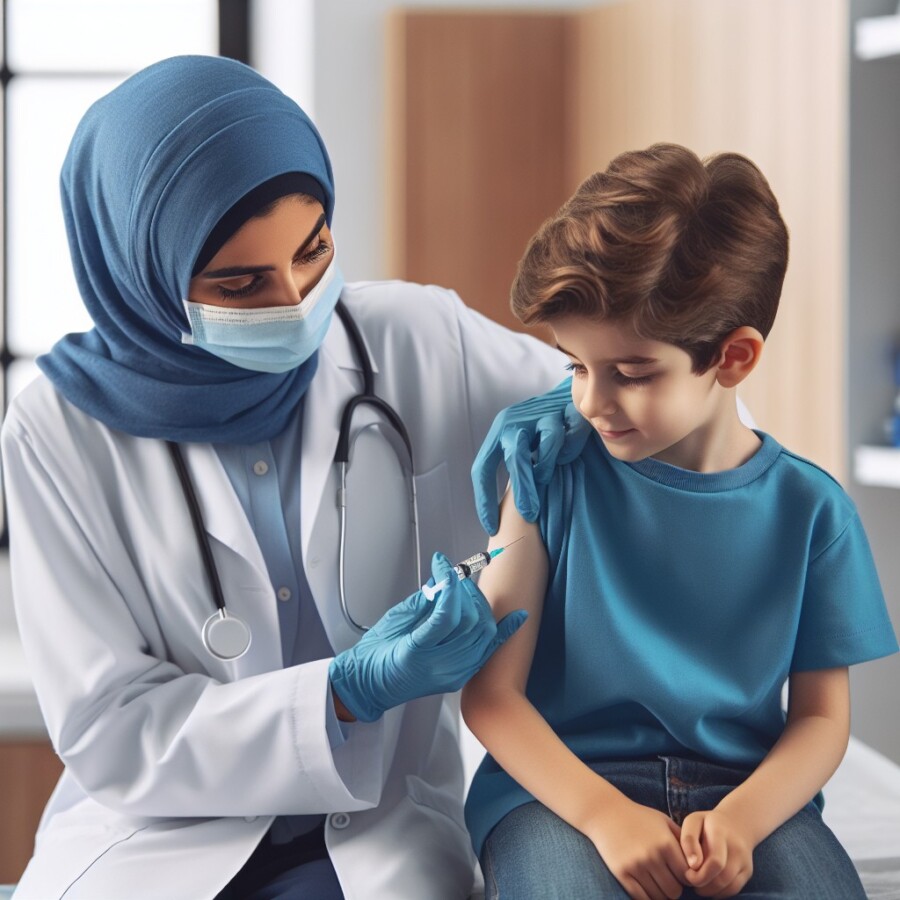There are now more cases of measles popping up in different parts of England, like London, the North West, Yorkshire, The Humber, the East Midlands, and the West Midlands. In the past month, there have been 166 cases, with 56 of those happening just last week. Measles is really easy to catch and will keep spreading unless more people get vaccinated. If you have measles, you might get a rash and a fever. The West Midlands has the most cases, especially in Birmingham. But the number of cases there is starting to stay the same. Other places with cases include London, the North West, Yorkshire, and The Humber, and the East Midlands.
Most of the people getting sick are kids and young people. You can prevent measles by getting the MMR vaccine. Dr. Vanessa Saliba from the UK Health Security Agency is worried because not enough people in some areas are getting the vaccine. That’s why there are more cases happening now. Some parents are getting their kids vaccinated, but there are still lots of kids who aren’t protected and could get really sick or have problems for the rest of their lives. Dr. Saliba really wants parents to get their kids vaccinated to keep them safe.
Measles is caused by a virus that spreads when someone coughs or sneezes. Common signs of measles include a high fever, watery and sore eyes, coughing, sneezing, and small white spots inside the mouth. A red or brown rash usually shows up a few days later, starting on the face and behind the ears before spreading to the rest of the body. It can be harder to see the rash on darker skin. Anyone who hasn’t been vaccinated can get measles, no matter how old they are. After getting both doses of the MMR vaccine, 99% of people are protected against measles and rubella, and 88% are protected against mumps. The first dose is usually given when a kid is 12 months old, and the second dose is given when they’re around three years and four months.
Not enough young kids in England have gotten both doses of the MMR vaccine. The World Health Organization says that at least 95% of kids should get both doses. But only about 85% of kids in England have gotten both doses by the time they turn five, which is the lowest it’s been since 2010-11. That means millions of kids under 16 haven’t gotten both doses and could be at risk. Measles usually goes away on its own in about a week to 10 days, but it can cause serious problems like pneumonia, meningitis, blindness, and seizures. In some cases, it can even be deadly.
Original news source: England now seeing clusters of measles cases (BBC)
🎧 Listen:
Slow
Normal
Fast
📖 Vocabulary:
| 1 | measles | A sickness that causes a skin outbreak and a high temperature, and spreads easily |
| 2 | vaccinated | Given a shot to protect against certain diseases |
| 3 | virus | A tiny germ that can make you sick |
| 4 | rash | Red or irritated skin that can show up because of an illness |
| 5 | fever | When your body gets hotter than normal because you’re sick |
| 6 | sneezes | When you forcefully blow air out of your nose, often because you’re sick |
| 7 | rubella | A disease that can cause a fever and swollen glands, prevented by a shot |
| 8 | mumps | A sickness that can make your cheeks swell and hurt, also prevented by a shot |
| 9 | pneumonia | A serious lung infection that can make it hard to breathe |
| 10 | meningitis | An infection that causes swelling around the brain and spine, can be very serious |
| 11 | seizures | Sudden, uncontrolled electrical disturbances in the brain, causing changes in behavior or movements |
| 12 | deadly | Something that can cause death |
| 13 | doses | The number of shots you need to get to be protected against a disease |
| 14 | immunity | The body’s ability to resist a particular disease |
| 15 | epidemic | A widespread occurrence of an infectious disease in a community at a particular time |
Group or Classroom Activities
Warm-up Activities:
– News Summary
Instructions: In pairs, students will read the article and then write a summary of the main points. They should focus on the locations where measles cases are increasing, the importance of vaccination, and the potential risks and complications of measles.
– Opinion Poll
Instructions: Students will work in small groups and discuss their opinions on vaccination and the responsibility of parents to get their children vaccinated. Each group will then conduct a poll within the class to gather opinions from other students. They should record the results and be prepared to share their findings with the class.
– Vocabulary Pictionary
Instructions: Divide the class into two teams. Give each team a set of vocabulary words from the article related to measles and vaccination. One student from each team will come to the front of the class and have one minute to draw pictures that represent the words. The rest of their team must guess the word based on the drawings. The team with the most correct guesses wins.
– Keyword Hangman
Instructions: Write several keywords from the article on the board, leaving out some letters. Students will take turns guessing the missing letters to complete the words. They can use the article as a reference to help them. This activity will reinforce their understanding of the vocabulary used in the article.
– Future Predictions
Instructions: In pairs, students will discuss and make predictions about the future of measles cases in England. They should consider factors such as vaccination rates, public health initiatives, and potential outbreaks. Each pair will then present their predictions to the class, explaining their reasoning behind their predictions.
🤔 Comprehension Questions:
1. Where in England have there been more cases of measles recently?
2. How many cases of measles have there been in the past month?
3. What are some common signs of measles?
4. Why is Dr. Vanessa Saliba worried about the number of cases?
5. How does measles spread from person to person?
6. What percentage of people are protected against measles and rubella after getting both doses of the MMR vaccine?
7. When is the first dose of the MMR vaccine usually given?
8. Why is it important for kids to get both doses of the MMR vaccine?
Go to answers ⇩
🎧✍️ Listen and Fill in the Gaps:
There are now more (1)______ of measles popping up in different parts of England, like (2)______, the North West, (3)______, The Humber, the East Midlands, and the West Midlands. In the past month, there have been 166 cases, with 56 of those happening just last week. Measles is really easy to catch and will keep spreading unless more people get vaccinated. If you have measles, you might get a rash and a fever. The West Midlands has the most cases, especially in (4)______. But the number of cases there is starting to stay the same. Other places with cases include London, the North West, Yorkshire, and The Humber, and the East Midlands.
Most of the people (5)______ sick are kids and young people. You can prevent measles by getting the MMR vaccine. Dr. Vanessa Saliba from the UK (6)______ Security (7)______ is worried because not enough people in some areas are getting the vaccine. That’s why there are more cases happening now. Some parents are getting their kids vaccinated, but there are still lots of kids who aren’t protected and could get really sick or have problems for the rest of their lives. Dr. Saliba really wants parents to get their kids vaccinated to keep them safe.
Measles is caused by a (8)______ that spreads when someone coughs or sneezes. Common signs of measles include a high fever, watery and sore eyes, coughing, sneezing, and small white spots inside the mouth. A red or brown rash usually (9)______ up a few days later, starting on the face and behind the ears before spreading to the rest of the body. It can be harder to see the rash on darker skin. Anyone who hasn’t been vaccinated can get measles, no matter how old they are. After getting both (10)______ of the MMR (11)______, 99% of people are protected against measles and rubella, and 88% are protected against mumps. The (12)______ dose is usually given when a kid is 12 months old, and the second dose is given when they’re around three years and four months.
Not enough young kids in England have (13)______ both doses of the MMR vaccine. The World Health Organization says that at least 95% of kids should get both doses. But only about 85% of kids in England have gotten both doses by the time they turn five, which is the lowest it’s been since 2010-11. That means (14)______ of kids under 16 haven’t gotten both doses and could be at risk. Measles usually goes away on its own in about a week to 10 days, but it can (15)______ serious problems like pneumonia, meningitis, (16)______, and seizures. In some cases, it can even be deadly.
Go to answers ⇩
💬 Discussion Questions:
Students can ask a partner these questions, or discuss them as a group.
1. What is measles and why is it spreading in different parts of England?
2. How would you feel if you had measles? Why?
3. Do you like getting vaccines? Why or why not?
4. Do you think it’s important for parents to get their kids vaccinated? Why or why not?
5. What is the MMR vaccine and how does it prevent measles?
6. How do you think measles is spread from person to person?
7. Why do you think some parents choose not to get their kids vaccinated?
8. How do you think the measles outbreak could be stopped?
9. Have you or someone you know ever had measles? How did they recover?
10. What are some of the symptoms of measles?
11. Why do you think it’s important for young kids to get both doses of the MMR vaccine?
12. How do you think the low vaccination rate in England could affect public health?
13. What are some of the potential complications of having measles?
14. Have you ever had any vaccines? How did you feel afterwards?
15. Do you think the government should make vaccines mandatory? Why or why not?
Individual Activities
📖💭 Vocabulary Meanings:
Match each word to its meaning.
Words:
1. measles
2. vaccinated
3. virus
4. rash
5. fever
6. sneezes
7. rubella
8. mumps
9. pneumonia
10. meningitis
11. seizures
12. deadly
13. doses
14. immunity
15. epidemic
Meanings:
(A) An infection that causes swelling around the brain and spine, can be very serious
(B) A disease that can cause a fever and swollen glands, prevented by a shot
(C) A widespread occurrence of an infectious disease in a community at a particular time
(D) A sickness that causes a skin outbreak and a high temperature, and spreads easily
(E) Red or irritated skin that can show up because of an illness
(F) A tiny germ that can make you sick
(G) A sickness that can make your cheeks swell and hurt, also prevented by a shot
(H) When you forcefully blow air out of your nose, often because you’re sick
(I) Sudden, uncontrolled electrical disturbances in the brain, causing changes in behavior or movements
(J) The body’s ability to resist a particular disease
(K) When your body gets hotter than normal because you’re sick
(L) Given a shot to protect against certain diseases
(M) A serious lung infection that can make it hard to breathe
(N) Something that can cause death
(O) The number of shots you need to get to be protected against a disease
Go to answers ⇩
🔡 Multiple Choice Questions:
1. Where are the cases of measles popping up in England?
(a) London, the North West, Yorkshire, The Humber, the East Midlands, and the West Midlands
(b) Scotland, Wales, and Northern Ireland
(c) France, Germany, and Spain
(d) Australia, Canada, and Japan
2. How many cases of measles have there been in the past month?
(a) 56 cases
(b) 100 cases
(c) 166 cases
(d) 200 cases
3. Who is most at risk of getting sick from measles?
(a) Adults over 50 years old
(b) Kids and young people
(c) Pregnant women
(d) Elderly people
4. How can you prevent measles?
(a) Eating healthy foods
(b) Washing your hands frequently
(c) Taking vitamin C supplements
(d) Getting the MMR vaccine
5. How does measles spread?
(a) Through physical contact
(b) When someone coughs or sneezes
(c) Through contaminated food and water
(d) Through mosquito bites
6. What are common signs of measles?
(a) High fever, watery and sore eyes, coughing, sneezing, and small white spots inside the mouth
(b) Headache, stomachache, and fatigue
(c) Muscle aches, runny nose, and sore throat
(d) Dizziness, loss of appetite, and diarrhea
7. How many doses of the MMR vaccine are recommended?
(a) One dose
(b) Three doses
(c) Four doses
(d) Two doses
8. What can happen if someone gets measles?
(a) Mild cold-like symptoms
(b) Temporary rash and fever
(c) Serious problems like pneumonia, meningitis, blindness, and seizures
(d) Nothing, it goes away on its own quickly
Go to answers ⇩
🕵️ True or False Questions:
1. In the past month, there have been a total of 166 measles cases, with 56 of them occurring last week.
2. Measles is not highly contagious and will continue to spread unless more people get vaccinated.
3. Symptoms of measles include a rash and fever.
4. The East Midlands has the highest number of measles cases, but the number is stabilizing.
5. Most of the people affected by measles are children and young people.
6. Other areas with measles cases include London, the North West, Yorkshire, and The Humber, and the West Midlands.
7. Measles cases are increasing in various parts of England, including London, the North West, Yorkshire, The Humber, the East Midlands, and the West Midlands.
8. The MMR vaccine is not the best way to prevent measles, but not enough people in some areas are getting vaccinated, leading to the increase in cases.
Go to answers ⇩
📝 Write a Summary:
Write a summary of this news article in two sentences.
Check your writing now with the best free AI for English writing!
Writing Questions:
Answer the following questions. Write as much as you can for each answer.
Check your answers with our free English writing assistant!
1. What are some of the areas in England where more cases of measles have been reported?
2. How many cases of measles have there been in the past month? How many of those cases were reported last week?
3. What are some common signs of measles?
4. Why is Dr. Vanessa Saliba worried about the number of people getting vaccinated in some areas?
5. What are some of the serious problems that can be caused by measles?
✅ Answers
🤔✅ Comprehension Question Answers:
1. Where in England have there been more cases of measles recently?
There have been more cases of measles in different parts of England, including London, the North West, Yorkshire, The Humber, the East Midlands, and the West Midlands.
2. How many cases of measles have there been in the past month?
In the past month, there have been 166 cases of measles, with 56 of those happening just last week.
3. What are some common signs of measles?
Common signs of measles include a high fever, watery and sore eyes, coughing, sneezing, and small white spots inside the mouth. A red or brown rash usually shows up a few days later, starting on the face and behind the ears before spreading to the rest of the body.
4. Why is Dr. Vanessa Saliba worried about the number of cases?
Dr. Vanessa Saliba is worried because not enough people in some areas are getting the MMR vaccine, which is causing more cases of measles to occur.
5. How does measles spread from person to person?
Measles spreads when someone coughs or sneezes, releasing the virus into the air. If someone breathes in the infected droplets or touches a surface with the virus and then touches their face, they can become infected.
6. What percentage of people are protected against measles and rubella after getting both doses of the MMR vaccine?
After getting both doses of the MMR vaccine, 99% of people are protected against measles and rubella, and 88% are protected against mumps.
7. When is the first dose of the MMR vaccine usually given?
The first dose of the MMR vaccine is usually given when a child is 12 months old.
8. Why is it important for kids to get both doses of the MMR vaccine?
It is important for kids to get both doses of the MMR vaccine because it provides the best protection against measles, rubella, and mumps. Getting both doses ensures that the immune system is fully prepared to fight off these diseases and prevents serious complications or long-term health problems.
Go back to questions ⇧
🎧✍️✅ Listen and Fill in the Gaps Answers:
(1) cases
(2) London
(3) Yorkshire
(4) Birmingham
(5) getting
(6) Health
(7) Agency
(8) virus
(9) shows
(10) doses
(11) vaccine
(12) first
(13) gotten
(14) millions
(15) cause
(16) blindness
Go back to questions ⇧
📖💭✅ Vocabulary Meanings Answers:
1. measles
Answer: (D) A sickness that causes a skin outbreak and a high temperature, and spreads easily
2. vaccinated
Answer: (L) Given a shot to protect against certain diseases
3. virus
Answer: (F) A tiny germ that can make you sick
4. rash
Answer: (E) Red or irritated skin that can show up because of an illness
5. fever
Answer: (K) When your body gets hotter than normal because you’re sick
6. sneezes
Answer: (H) When you forcefully blow air out of your nose, often because you’re sick
7. rubella
Answer: (B) A disease that can cause a fever and swollen glands, prevented by a shot
8. mumps
Answer: (G) A sickness that can make your cheeks swell and hurt, also prevented by a shot
9. pneumonia
Answer: (M) A serious lung infection that can make it hard to breathe
10. meningitis
Answer: (A) An infection that causes swelling around the brain and spine, can be very serious
11. seizures
Answer: (I) Sudden, uncontrolled electrical disturbances in the brain, causing changes in behavior or movements
12. deadly
Answer: (N) Something that can cause death
13. doses
Answer: (O) The number of shots you need to get to be protected against a disease
14. immunity
Answer: (J) The body’s ability to resist a particular disease
15. epidemic
Answer: (C) A widespread occurrence of an infectious disease in a community at a particular time
Go back to questions ⇧
🔡✅ Multiple Choice Answers:
1. Where are the cases of measles popping up in England?
Answer: (a) London, the North West, Yorkshire, The Humber, the East Midlands, and the West Midlands
2. How many cases of measles have there been in the past month?
Answer: (c) 166 cases
3. Who is most at risk of getting sick from measles?
Answer: (b) Kids and young people
4. How can you prevent measles?
Answer: (d) Getting the MMR vaccine
5. How does measles spread?
Answer: (b) When someone coughs or sneezes
6. What are common signs of measles?
Answer: (a) High fever, watery and sore eyes, coughing, sneezing, and small white spots inside the mouth
7. How many doses of the MMR vaccine are recommended?
Answer: (d) Two doses
8. What can happen if someone gets measles?
Answer: (c) Serious problems like pneumonia, meningitis, blindness, and seizures
Go back to questions ⇧
🕵️✅ True or False Answers:
1. In the past month, there have been a total of 166 measles cases, with 56 of them occurring last week. (Answer: True)
2. Measles is not highly contagious and will continue to spread unless more people get vaccinated. (Answer: False)
3. Symptoms of measles include a rash and fever. (Answer: True)
4. The East Midlands has the highest number of measles cases, but the number is stabilizing. (Answer: False)
5. Most of the people affected by measles are children and young people. (Answer: True)
6. Other areas with measles cases include London, the North West, Yorkshire, and The Humber, and the West Midlands. (Answer: False)
7. Measles cases are increasing in various parts of England, including London, the North West, Yorkshire, The Humber, the East Midlands, and the West Midlands. (Answer: True)
8. The MMR vaccine is not the best way to prevent measles, but not enough people in some areas are getting vaccinated, leading to the increase in cases. (Answer: False)
Go back to questions ⇧















